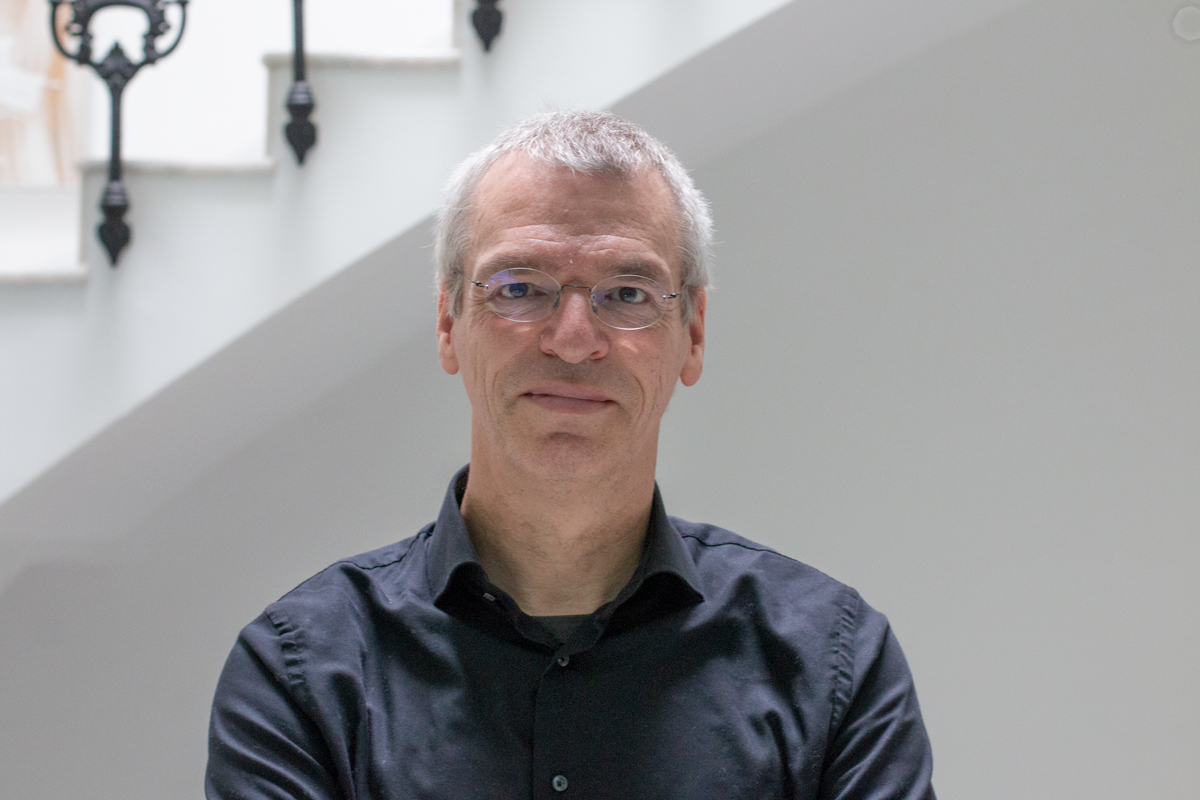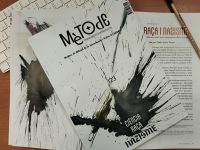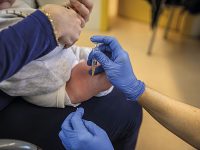Interview with Leo van Bergen
«In wartime medicine, medics are not only loyal to the patients, but to state and military interests»
History and military-medical expert

Leo Van Bergen is a military-medical expert and member of the editorial board for the international peer reviewed journal Medicine, Conflict and Survival, which deals with the health consequences of war and the role medicine has to play. His work focus ranges from the history of suffering during the First World War to Red Cross humanitarianism and the ways in which leprosy has been dealt with historically in Dutch colonies.
We recently had an opportunity to interview Leo Van Bergen following his visiting lecture «Monkeyman: Poison Gas and WWI», delivered on 21 November 2018 at the Palau Cerveró, which is the Valencia home of the recently founded Inter-University Institute López Piñero. His lecture was the first in our four-part seminar series «In the centenary of the Armistice: Health, medicine and humanitarianism during WWI (1914-1918) and its aftermath», organised by the aforementioned Institute at the University of Valencia and the Catalan Society of History of Science and Technology (SCHT in its Catalan initialism).
The lecture’s title alludes to the gross dehumanization that accompanies the use of gas in war and the monkey-like face of the iconic gas-mask. In «Monkeyman», professor Van Bergen explores the new kinds of suffering and horror that soldiers were exposed to during WWI and, to a lesser extent, the problems that it involved for a military command that was not accustomed to the new grim realities of twentieth-century warfare. He also questions some of the common narratives which usually accompany the topic and highlights the justifications which were used at the time – some even claimed that a gas war was a «humane war».
«Gas warfare was never a military success. It was a humanitarian disaster»
World War I is remembered as being the first war which embodied the mechanical/technological principle of modernity – chemical weaponry being one of the presiding symbols of this – and with gas came the gas mask. Could you first give us a brief account of the military use of gas throughout WWI and its effects on soldiers during and after the conflict?
Officially, gas warfare started on 22 April 1915, when north of Ypres, thousands of tons of chlorine gas were released from vaults by the Germans, drifting towards enemy lines, the French, etc. About 5,000 people died and it left an enormous gap, so the first attack was a huge success. Only the Germans did not expect it to be, so there were no reserve lines to take over the country and soon enough the allies closed the gap. It could have been a huge military success but it was not. And in fact, now that the advantage of surprise was gone, because now the allied knew «we can expect gas warfare», it was never a military success. It was a humanitarian disaster – medical effects were catastrophic. Troops had chest trouble, heart problems, eye problems, not only for a short time, but in many cases for an extremely long time, or even some thought they were cured, only to have it return years after the war. On the other hand, only – quote marks, «only» – 100,000 people died [from this kind of attack]. This is of course an enormous number, but seeing the fact that almost 10 million soldiers died during the war, it is only 1%. So you could argue that, in fact, that gas warfare was not as destructive as we now say.
And what about long-term effects?
Heart problems, eye problems, skin problems, lung problems, and of course you could say death is a long-term effect, be it within a couple of weeks or years after
In terms of the legal distinctions which have been made between gas and «conventional» weaponry since the end of WWI, what have you found in your studies that sets gas apart and makes it appear so horrific in the already bloody arena of warfare?
Because it was an indiscriminate weapon – this is, of course, very paradoxical. Weapons are the only things in which discrimination is a positive thing, because we want to be able to aim at the one we want to kill or wound, and not have something released that leads to the situation: «Maybe he will get killed, maybe they both will get killed, maybe somebody else we do not even see gets killed». Then again it is a rather strange distinction, because when we launch or drop bombs from miles and miles behind the front line, we also do not know who we are hitting – and that is also indiscriminate. And when you put a person who has only had one week of training behind a machine gun, he will also kill indiscriminately.

And it was during WWI that we coined the term friendly fire, was it not?
Friendly fire, exactly. It is quite a paradoxical dynamic, why do we call a machine gun «discriminate» and poison gas «indiscriminate»?
In a 2014 interview, you mentioned that the strategic use of medicine in WWI not only saved lives, but cost lives, dragging out the war for longer than it might have otherwise. Would you care to elaborate on the use of army medicine as a military tool above all?
Well, first, in military medicine – or wartime medicine, because we must include the Red Cross and so on – [medical personnel] first need to have military importance in mind. They are not only loyal to the patient, but have to take a good look at state interests and military interests. They cannot simply act as medical men, and even if they want to act as medical men, they will probably also act as French and Brits and Germans who want their side to win. But apart from that, when you look at the numberof wounded in every war, more or less there is one death per four wounded. If you wage this war with clubs or machine guns, this ratio does not change, however if you use machine guns the numbers will obviously be much higher. This means that in WWI, besides ten million dead there had to be approximately about forty million wounded. This number is now down to fifteen or twenty million, but this is the number count after the war, where every wounded is just one wounded. But during the war several people got wounded several times, so that raises the number. If, of those forty million wounded, approximately 80–90% are returned to the front lines, or at least to the weapons factory, that has a prolonging effect. Because if we are talking about 30–35 million people, if they cannot get back to the weapons factory or the front, there is an enormous drain of military power, which has an effect on the length of the war and on the numbers of people engaged in battles like Verdun, Somme, or Ypres. And so, [due to wartime medicine], war has been fought with more men and has been fought I think for far longer because human resources were filled and filled and filled. But, of course, it is impossible to say whether medical men saved more people than they sent back to the front lines, but it is important to keep this effect in mind. There was a Dutch nurse who said: «Well, maybe we should just quit. We should quit medical care during war time, and certainly quit medical preparation on war. Because if we medics say we will not engage in it again, maybe war will be impossible and it certainly would have to be waged with fewer people, and then maybe we would save more men than any medical intervention would save». Therefore, quitting medical work, she said, is more in agreement with the Hippocratic Oath than engaging in it. But it is impossible – we cannot neglect wounded and sick for military aid, but it nevertheless is necessary to keep the effect in mind.
Much is made in some quarters about the productive power of war, on how innovations in industry and technology occur much quicker during wartime due to necessity. In the field of medicine, it is argued that the sudden influx of injured and maimed patients allowed medical procedures to be refined in such a way that would not have been possible during peace-time. Is this a view you would support?
No. Not at all. I most fiercely disagree. There are a number of reasons for this, but I will try to keep it brief. First of all, peace time has everything that is necessary for really fundamental medical progress, which war lacks. There are international possibilities for consultation, having an eye on one’s research, being able to repeat experiments as well as having a long aftercare for your patients… All of this is seldom possible during war-time. Secondly, medical experiments in wartime focus on what is necessary for war – these experiments are not actually necessary for medicine in general, but only to solve a problem that is completely caused by the circumstances of war. For instance, when you, a doctor in November 1918, arrive into a hospital fresh from the war and you say «I am an expert in treating gas gangrene patients», what they would tell you is «Well, that is very nice, however we do not have any gas gangrene patients anymore, we have no use for your expertise» because gas gangrene was solely the result of trench warfare. And there are lots and lots of examples of this. It could be argued that some fields of medicine have profited from war because they could show that they were important for fighting strength – areas such as psychiatry and, of course, surgery. However, fields of medicine which could not show their use for fighting strength – gynaecology, paediatric care, and so on – declined, because they did not get any money, because they were not important to the war. Medicine for civilians was an utter shamble during wartime, because historically in war-time situations men were seen as more important than women and children and the elderly, and soldiers more important than civilians.
«If, of forty million wounded, 80–90% are returned to the front lines, or at least to the weapons factory, that has a prolonging effect on the war»
So war is not good for medicine: medicine is good for war, and peace is good for medicine.
What was occurring at the front was so horrific that it was felt that there had to be a story, a positive story for the home front to keep morale up, and medical care for the soldiers was this story. And I believe that there is another reason: after the war doctors began to realise the role that they had played had not been solely and simply medical, but a military one, that in fact they had handled in a way that was not quite in line with the Hippocratic Oath. So they began to make this story up: «Well, at least we have learned a lot, at least we have experience… The experiments and their outcomes we can still use! So, no matter how destructive the war was, we can now use this knowledge to save people’s lives, cure their wounds and heal their illnesses». But it was a made-up story. One of those who pushed this story was a Dutch war surgeon of Swiss origin, who in 1914 immediately rushed to a German hospital to help, and within a year he rushed back to Utrecht, glad to be away from the barbarous «medieval-times butchery» that was occurring medically on the front lines. And then, later, in 1925 he claimed «We learned a lot!». No, they did not. Another Dutch doctor, very well-known within his generation in the Netherlands, and active at the front the entire war, on the contrary claimed that nothing new was learned – only how to do what they already knew faster. His ideas, however, were completely neglected by the protagonists, who only pointed at items verifying their ideas instead of seeking for falsifications

In your book Before my helpless sight, you make mention that the Germans saw traumatised soldiers as «strikers» whereas the British and French tended to feminise them. Could you make a quick comment on how mental illness, shell-shock and psychological trauma were dealt with medically during and after the war?
That depends on whether you were a soldier or an officer: officers were shipped off to nice hospitals with beautiful surroundings and they had time to recover. When, after about a year, it became obvious that shell-shock was not only a medical problem, but because of the enormous size had also become a military problem, medics began to think of another procedure, a quick one, which the English called the «quick cure», and that the Germans called the «Überrumpelungsmethode», which is a wonderful German word, implying much more about its devastating effects than the English «quick cure». What it meant was that you get into a room, the doctor locks the door and says, «You shall heal and you will not go before you are healed». And to achieve this, everything was allowed: pain through electricity, putting out cigarettes on the skin, etc. The idea was that the soldier has to be more afraid of the doctor and the hospital than he is of the front, and that he must return there. In general, it was a military success, but it was not a medical success because they were being sent back to the very reason why they had gone mad in the first place. But the reason why they had gone mad – war – had to be denied, so it had to be argued that madness was already in them. Efforts were made to say that [madness] had been already detected in their family, or that in some way they had already proven before the war that they were not men, because they did not chase girls or blow up frogs or whatever. So back to your question, psychiatrists therefore in general tended to blame insanity on a lack of a «steadfast character». The Germans, however, were in general satisfied when they could get their mental cases back to the weapons factory. They could do their bit for the war effort and they did not see them back within one or two weeks. The French and the British, contrary to this, saw mental cases as feminised men – said that they had become women – and what is better proof that the man inside the soldier had been restored, than to prove himself at the front, fighting with weapons and killing enemies? And the longer he spent at the front the more of a man he was.
«After the war doctors began to realise the role that they had played had not been solely and simply medical, but a military one»
That is dreadful.
It is, and it is yet another reason why war is not good for medicine. In 1916 the diagnosis of «traumatic neurosis» – seeing or being part of a traumatic experience could cause the mind to go AWOL – which already existed before the war, was knocked out of the diagnostic toolkit. That is, «traumatic neurosis» no longer exists, because it could be used to show that war could be a maddening experience, so it had to be obscured and denied. This also went for definitions of sickness and illness. Sickness in WWI was not that you had a virus or bacteria, etc., rather it meant that you were either sick or wounded, but not as a result of the war. Wounded meant that you were sick or wounded as a result of the war. This was not simply a game of words, but had serious consequences, because when you were declared sick you had no right to a pension, when wounded you did. So, it was the object of doctors to declare as many men as possible sick, because that would save the state lots of money. This distinction also existed for shellshock, a word by the way quickly hated by the medical community because of the obvious link it had with warfare. They tried to exchange it for the so-called objective «Not Yet Diagnosed: Nervous (NYDN)». There was shellshock-sick and shellshock-wounded. Shellshock-wounded meant that you got shellshock as a result of the war, and when you were shellshock-sick it was not as a result of the war. It was always very difficult to be signed off as shellshock-wounded in the field, and at the end of 1917 it was declared from above – governmental decision, not medical – that shellshock-wounded was not possible anymore. Every case after that time was shellshock-sick, so none of them would receive a pension.
«Peace time has everything that is necessary for really fundamental medical progress, which war lacks»
Considering that the centenary of the Armistice Day was just a few weeks back, what do you consider to be the most important thing for current and future generations to remember about WWI? And how do you think we should treat the act of commemoration?
It is a difficult question. What we should remember, I think, speaking as an idealist – not a historian – is the enormous danger that modern nationalism (which is gaining momentum) contains within itself. What we should commemorate is that millions and millions of young men – deceived by politics, deceived by intellectuals – died in horrific circumstances. And for what? Nothing, I think.
And do you feel that popular contemporary representations of the war adequately communicate this?
Some do, some do not. It is very much the same as in the monuments – some are patriotic and shout «bravo, hoorah!», and some are as the Grieving parents at Vladslo [a German war cemetery in Belgium], which do show what needs to be shown. That war is grief.





